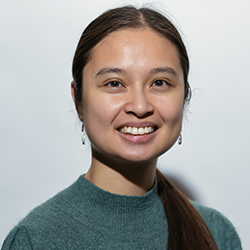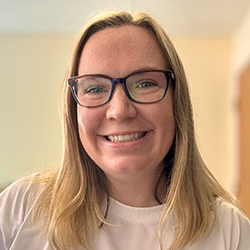
The Manulife Scholarship program offers three scholarships of $12,500 each annually to provide financial assistance to engineers returning to university for further study or research in an engineering field. Candidates must be accepted or registered full time in a Faculty of Engineering.
Applicants may only apply in one scholarship category per year.
Meet the 2024 recipients of the Engineers Canada - Manulife Scholarship recipients
Amy Do, P.Eng.

Master of Applied Science in Civil Engineering
Toronto Metropolitan University
The latest Canadian Infrastructure Report Card published in 2019 concluded that “the state of our infrastructure is at risk” – A major concern for many municipalities and infrastructure agencies. Amy Do is on a mission to reduce these risks through her research, integrating climate mitigation and infrastructure asset management. She is investigating quantitative tools for carbon accounting and developing a method to incorporate carbon emissions into the planning of maintenance and reconstruction activities of infrastructure. This research is a direct response to emerging urgency for many agencies to meet sustainable goals, and support global initiatives such as the Carbon Disclosure Project and Zero Emissions. Amy believes that by integrating environmental impact calculations into decision-making processes, we can forge a path towards a more resilient and sustainable future, ensuring that the infrastructure we build is an asset, not a liability, for generations to come.
Monica Ho, P.Eng.

Master of Applied Science in Chemical Engineering - Nanotechnology
University of Waterloo
Early in her career, Monica Ho committed herself to solutions addressing climate change, a dedication she upholds through ongoing studies in chemical engineering. While she deeply values her professional experience in climate mitigation, she set out to expand her skills and knowledge around the complexities of tackling climate change beyond engineering through her work with interdisciplinary colleagues. With more than seven years experience supporting the safe and reliable operations of power plants across North America, she is well positioned to undertake her research to create an energy efficient direct air carbon dioxide (CO2) capture system designed to be operable with clean electricity. Using her knowledge to advance direct air capture (DAC), a promising technology that removes CO2 from ambient air, she aims to reduce DAC costs and allow for the sustainable and widescale deployment of DAC to tackle the climate crisis.
Sarah Rixon-Gunnewiek, MASc., P.Eng

PhD in Water Resources Engineering
University of Guelph
Groundwater is often neglected from water quality and quantity studies in rural areas, but may play an important role in activating hazards such as excess nutrient loss from agricultural fields or flash-flooding. As a resident of a rural area, Sarah Rixon-Gunnewiek has witnessed the impacts of mismanaged rural water first-hand. Studying a PhD in Water Resources Engineering, her research focuses on two rural watersheds in southwestern Ontario that have continuous water quality and flooding issues, and are under pressure from municipal development, intensification of agricultural practices and changing climate conditions. This research aims to highlight the importance of groundwater on hazard activation in rural settings, and explore feasible methods to include groundwater in rural water studies. Her industry experience as an Environmental Scientist and Water Resources Engineer coupled with her academic knowledge will contribute to deeper investigation of these challenges through her PhD.


